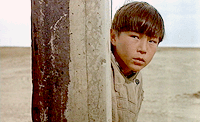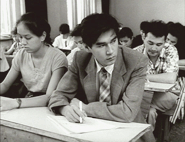 Kardiogramma, 1995. A lone, mischievous village boy (Jasulan Asauov) unproductively roams around the vast, desolate steppes of Kazakhstan scrawling infinite parallel lines around the exterior walls of a disused way station before walking up to the side of the railroad tracks at the sight of an approaching train, picking up a nearby rock, and inexplicably hurling the projectile onto an arbitrary compartment, consequently breaking the window of an unsuspecting passenger who instinctively turns away from the dislodged shards resulting from the impact. A cut to the film title reveals the identity of the random target as Kaïrat (Kaïrat Mahmetov), a young man from a rural province traveling to the city of Almaty to complete his university studies. The strangely coincidental and understatedly whimsical episode provides an appropriate preface to plight of the hapless protagonist who is subsequently shown taking his final examinations while unpropitiously being seated in between identical twin siblings passing crib notes to each other. Caught in the act of relaying a note between the sisters – an equally ironic turn of events that recalls the professor’s earlier ethically reprehensible exchange of secret admirer messages with a student at the back of the classroom – Kaïrat fails his examinations. Forced to find another avenue of employment while waiting out a year to retake the institute exams, Kaïrat remains in Almaty, retains his shared dorm room accommodations, and enters vocational training at a bus driver school where his instructor casually teases him on his apparent indifference to having a girlfriend. With the seed of romantic pursuit inextricably planted in Kaïrat’s thoughts, the adrift and fanciful young man begins to occupy his time in search of the object of his affection, eventually setting his sights on an attractive young woman with a straw hat at a movie theater, a genial and independent-minded train stewardess named Indira (Indira Jeksembaeva).
Kardiogramma, 1995. A lone, mischievous village boy (Jasulan Asauov) unproductively roams around the vast, desolate steppes of Kazakhstan scrawling infinite parallel lines around the exterior walls of a disused way station before walking up to the side of the railroad tracks at the sight of an approaching train, picking up a nearby rock, and inexplicably hurling the projectile onto an arbitrary compartment, consequently breaking the window of an unsuspecting passenger who instinctively turns away from the dislodged shards resulting from the impact. A cut to the film title reveals the identity of the random target as Kaïrat (Kaïrat Mahmetov), a young man from a rural province traveling to the city of Almaty to complete his university studies. The strangely coincidental and understatedly whimsical episode provides an appropriate preface to plight of the hapless protagonist who is subsequently shown taking his final examinations while unpropitiously being seated in between identical twin siblings passing crib notes to each other. Caught in the act of relaying a note between the sisters – an equally ironic turn of events that recalls the professor’s earlier ethically reprehensible exchange of secret admirer messages with a student at the back of the classroom – Kaïrat fails his examinations. Forced to find another avenue of employment while waiting out a year to retake the institute exams, Kaïrat remains in Almaty, retains his shared dorm room accommodations, and enters vocational training at a bus driver school where his instructor casually teases him on his apparent indifference to having a girlfriend. With the seed of romantic pursuit inextricably planted in Kaïrat’s thoughts, the adrift and fanciful young man begins to occupy his time in search of the object of his affection, eventually setting his sights on an attractive young woman with a straw hat at a movie theater, a genial and independent-minded train stewardess named Indira (Indira Jeksembaeva).
Fueled by the creative autonomy afforded by the Soviet-era economic reforms of perestroika (that also led to the emergence of the Kazakh new wave during the latter half of the 1980s), mathematician and film theorist turned filmmaker Darezhan Omirbaev creates an elegantly distilled, poetic, and humorously self-reflexive semi-autobiographical portrait of aimlessness, alienation, sentimental crossroads, and the strange, bewildering process of maturation in Kaïrat. Influenced by the visual precision and narrative economy Robert Bresson and Alfred Hitchcock, Omirbaev achieves a distinctiveness and singularity in his spare and dedramatized cinema through an acute sense of landscape, idiosyncratic (and subtly recursive) fusion of dreams and subconscious reality, muted, deadpan humor, and idiosyncratic integration of incongruous, off-camera diegetic external sounds – the clinking of dropped, loose change; the slow dripping of water; the muffled, low fidelity echoing broadcast of a train station public address system; ticking clocks; and the monotonic chirping of an unseen bird – in order to presage narrative ellipses or transitional states of consciousness. Omirbaev further incorporates episodes of truncation – repeated walk-outs during film screenings with Indira, an aborted Ferris wheel ride (that recalls an earlier scene on a film involving two lovers), and a procrastinated reckoning with the dorm bully, Jan (Talgat Assetov) – that further reflect Kaïrat’s own figuratively stalled life adventure. In the end, it is this existential displacement that is reflected in Omirbaev’s familiar, recurring filmic image of decorative mobiles: an indelible reminder of the human imperative to propel life’s fragile, dynamic motion and the personal need to find one’s place of balance within its complex, interrelated structure.
 July, 1988. Darezhan Omirbaev’s penchant for spare, elliptical narrative, muted figures, and disembodied framing (most notably, of hands and feet) have often been (favorably) compared to the rigorous aesthetic of Robert Bresson. However, in imposing such a somber – and inescapably cerebral – analogy, there is also a propensity to overlook the wry, self-effacing humor and irony of situation that pervade his films: a lyricism that equally captures the human comedy in all its contradictions and nobility from the margins of Soviet society. This sense of the quotidian as a continuum of human experience, elegantly rendered in Omirbaev’s recent film, The Road through Amir’s recurring daydream of a mother milking a cow and her intrusive child (who, in turn, looks remarkably like Amir’s own son) in rural Kazakhstan (an image that subsequently proves to be a catalytic historical memory from his childhood when man landed on the moon), can also be seen from the outset of Omirbaev’s cinema through his incorporation of a decidedly Buñuelian sequence in the short film, July of a young boy who, while on the lookout for guards near the foothills of a kolkhoz commissary, curiously finds himself wandering into a recital hall where the performance of a young pianist is punctuated by the appearance of a horseman on the stage. Part pastoral observation on the pervasiveness of underdevelopment and the austerity of life in the rural villages of Soviet-era collective farms (and in particular, at the outlying frontiers of the Soviet Central Asia), and part autofiction on a pair of restless boys whose penchant for escapist (mis)adventures reveal a nascent, if displaced, creative sensibility, July establishes the aesthetic framework that would come to define Omirbaev’s cinema: the overture of first love depicted through seemingly innocent – yet deliberate – passing touches (the bus encounter in Kaïrat, the movie house flirtation in July); the frustration of isolation inherent in a rural childhood manifested through acts of mischief (the opening sequence of Kaïrat, the courtyard fight of Kardiogramma), the subconscious act of self-reflection illustrated through literal self-reflection through the reflected image of a rear view mirror (Marat’s drive home from the hospital in Killer, Amir’s extended road trip to visit his ailing mother in The Road). Inevitably, what proves to be the most remarkable – and irresistible – aspect of Omirbaev’s deceptively simple coming of age film is its ability to capture the interpenetration between reality and fiction interpenetrate with such seemingly effortless, uninhibited intimacy – a wide eyed innocence that hovers in the ephemeral – ever teetering between solemnity and absurdity, boredom and roguishness, anxiety and imagination.
July, 1988. Darezhan Omirbaev’s penchant for spare, elliptical narrative, muted figures, and disembodied framing (most notably, of hands and feet) have often been (favorably) compared to the rigorous aesthetic of Robert Bresson. However, in imposing such a somber – and inescapably cerebral – analogy, there is also a propensity to overlook the wry, self-effacing humor and irony of situation that pervade his films: a lyricism that equally captures the human comedy in all its contradictions and nobility from the margins of Soviet society. This sense of the quotidian as a continuum of human experience, elegantly rendered in Omirbaev’s recent film, The Road through Amir’s recurring daydream of a mother milking a cow and her intrusive child (who, in turn, looks remarkably like Amir’s own son) in rural Kazakhstan (an image that subsequently proves to be a catalytic historical memory from his childhood when man landed on the moon), can also be seen from the outset of Omirbaev’s cinema through his incorporation of a decidedly Buñuelian sequence in the short film, July of a young boy who, while on the lookout for guards near the foothills of a kolkhoz commissary, curiously finds himself wandering into a recital hall where the performance of a young pianist is punctuated by the appearance of a horseman on the stage. Part pastoral observation on the pervasiveness of underdevelopment and the austerity of life in the rural villages of Soviet-era collective farms (and in particular, at the outlying frontiers of the Soviet Central Asia), and part autofiction on a pair of restless boys whose penchant for escapist (mis)adventures reveal a nascent, if displaced, creative sensibility, July establishes the aesthetic framework that would come to define Omirbaev’s cinema: the overture of first love depicted through seemingly innocent – yet deliberate – passing touches (the bus encounter in Kaïrat, the movie house flirtation in July); the frustration of isolation inherent in a rural childhood manifested through acts of mischief (the opening sequence of Kaïrat, the courtyard fight of Kardiogramma), the subconscious act of self-reflection illustrated through literal self-reflection through the reflected image of a rear view mirror (Marat’s drive home from the hospital in Killer, Amir’s extended road trip to visit his ailing mother in The Road). Inevitably, what proves to be the most remarkable – and irresistible – aspect of Omirbaev’s deceptively simple coming of age film is its ability to capture the interpenetration between reality and fiction interpenetrate with such seemingly effortless, uninhibited intimacy – a wide eyed innocence that hovers in the ephemeral – ever teetering between solemnity and absurdity, boredom and roguishness, anxiety and imagination.
Acquarello, 2004 [reprinted]